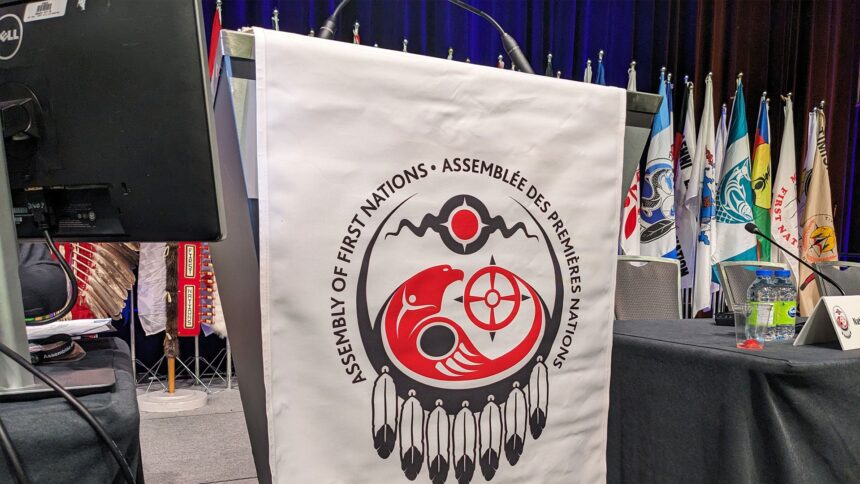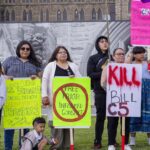First Nations chiefs voiced their concerns during a virtual forum hosted by Assembly of First Nations (AFN) National Chief Cindy Woodhouse Nepinak on the federal government’s contentious Bill C-5 or One Canadian Economy Act. “There seems to be this rush to get it done as soon as possible and because of that, Canada is not fulfilling its consultation requirements and the free, prior and informed consent obligations that First Nations have to be involved,” said First Nations Summit political executive Robert Phillips from British Columbia who took part in the forum. Government House leader Steven MacKinnon made a notice of motion on June 12 that would push Bill C-5 through the House of Commons by the end of this week. The bill is part of Prime Minister Mark Carney’s election commitment to build Canada’s economy to fight the uncertainty caused by U.S. President Donald Trump’s tariffs. “The other concern of course is that the bill allows the prime minister and federal cabinet to have powers (that could negate) legislation and regulation, such as the Impact Assessment Act and the Canada Energy Regulation Act, even bypassing the Indian Act itself so the development of major projects in quote ‘the national interest’ can go forward,” Phillips told APTN News. Phillips was also part of a B.C. delegation that travelled to Ottawa for meetings last week. Representatives from the First Nation Energy & Mining Council (FNEMC) a technical arm of the First Nations Leadership Council (FNLC) and First Nations of B.C. were also part of the contingent. While they didn’t discuss Bill C-5 specifically, Phillips said there were discussions on the Regional Energy and Resource Table (RERT); alignment of the First Nation Critical Minerals Strategy with B.C. and Canada, clean energy projects, infrastructure and workforce development. Phillips said the delegation met with NRCan [Natural Resources Canada], Global Affairs, senators, chiefs of staff and various MP’s. “Although government inquired and had interest, we received no answers from Canada,” Phillips said of the government not committing to their 20 proposals on mining and energy in B.C. While the federal government has promised consultation through an “Indigenous Advisory Council” under Bill C-5, Phillips said First Nations need more. “They can set up an advisory council but they can’t fill it with ‘yes people.’ We have to have leaders in there who are informed, that have a connection to First Nations, then they can make informed decisions,” Phillips asserted. “There is some forms of consultation that may be in Bill C-5 but it’s almost after the fact so that’s why we’re seeing we have to get into negotiations.” Phillips pointed to negotiated agreements between some First Nations in B.C. with business partners where consent is built into the agreements. He said that these types of agreements should be the rule across Canada. Phillips also said First Nations leadership should have been at the table during the G-7 summit in Alberta as clean energy and critical minerals were discussed. “International leaders are looking at Canada and British Columbia’s critical minerals,” Phillips said. “I do think we almost have to be everywhere. I know there’s only one national chief but there’s many regional chiefs.” Phillips isn’t wrong. After the G7 meeting broke, the prime minister sent a communique outlining the importance that the world work together to develop a “critical minerals action plan.” “We, the Leaders of the G7, recognize that critical minerals are the building blocks of digital and energy secure economies of the future,” the joint statement from world leaders said. “We remain committed to transparency, diversification, security, sustainable mining practices, trustworthiness and reliability as essential principles for resilient critical minerals supply chains, and acknowledge the importance of traceability, trade, and decent work in contributing to our economic prosperity and that of our partners.” Don’t introduce Trump-like legislation AFN tells senators Following the AFN’s virtual forum Monday night, National Chief Cindy Woodhouse Nepinak presented her arguments to the Senate Committee of the Whole. She acknowledged that the federal legislation is moving so fast, she was speaking without a resolution from chiefs – which is unusual. She said that while Canada is trying to protect itself from Trump, the solution isn’t to introduce Trump-like legislation. “We know how it feels to have Trump at our borders. Let’s not do that and have Trump-like policies with each other. Let’s take the time and do things properly,” she said. Critics of Bill C-5 say it would allow the executive branch to skirt laws in order to push forward major projects. Some constitutional experts say some provisions of the bill would likely survive a court challenge. But others like Woodhouse Nepinak and Phillips warn the proposed law would allow Ottawa to flout its constitutional duty to consult with First Nations under Section 35 of the constitution and it will lead to litigation. “I do think that we’re at a crossroads and I think if the Liberal government wants to continue with reconciliation it has to follow its own laws. First Nations are very concerned, not only in terms of the law itself but significant procedural and substantive concerns with the bill,” Phillips said. “When we see this rushing of projects-fast tracking potentially-we’re talking about more litigation because a First Nation runs out of options if they’re not properly consulted, don’t give their consent, and don’t have agreements in place. Then obviously they’ll look at all avenues.” British Columbia recently passed similar provincial bills around resource development and Phillips said as a leader, he has heard both sides of the argument. “There are those that want to get economic development going, they do want the jobs, the skills and training, they want the revenue sharing, the equity agreements in place where they’re part of it and ownership of it on their own terms,” Phillips said. “But we can’t have these agreements going ahead with ‘trust us we will take care of you’ and it can’t be after the fact-we have to be at the table now.” For some, including Conservative MP Billy Morin (Edmonton Northwest) who is a former chief of Enoch Cree Nation, things aren’t moving fast enough. He spoke in the House Monday night and said he also believes the Carney government is focusing on the wrong things. “Under this Liberal Bill C-5, the government will again have its own laws to make an excuse not to get things built. That is where the real answer lies,” he said. “The answer needed to make Canada an economic superpower is to repeal Bill C-69, the no new pipeline law; repeal Bill C-48, the tanker ban; repeal the cap on Canadian energy; repeal the industrial carbon tax; repeal those things rather than being too cute by half with Bill C-5.” However, opposition to Bill C-5 in many circles seems to be growing. Chiefs of Ontario, the federal NDP, the Green Party and the First Nations Climate Initiative are the just the latest to voice their disapproval. A rally against the bill on Parliament Hill Tuesday drove home the message. “By ramming this bill through parliament and failing to consult the groups impacted, the Liberals are violating the democratic process and embracing the same kind of authoritarianism we’re seeing under Trump,” said Winnipeg Centre NDP MP Leah Gazan. “They do have the UN Declaration Act (UNDA) so they do need to discuss directly with title and rights holders,” Phillips said. “If not, it’s an old colonial road of going into our territories and taking our lands and resources.” With files from The Canadian Press Tags: AFN, Assembly of First Nations, clean energy, critical minerals, First Nations Summit, G7 summit, Indigenous Advisory Council, Regional Energy and Resource Table, Senate Committee of the whole, tariffs, U.S. President Donald Trump Continue Reading
Chiefs from across the country tell AFN they have substantive concerns over Liberals Bill C-5

Leave a Comment










